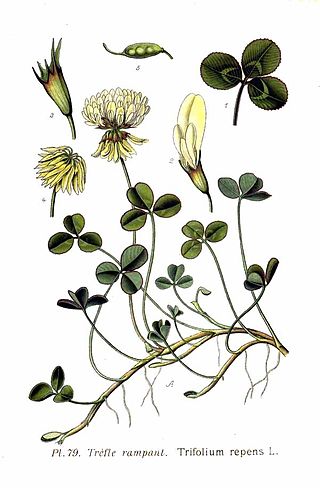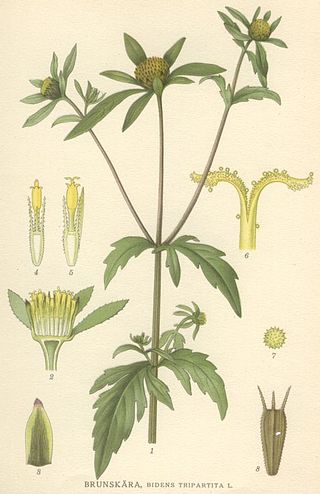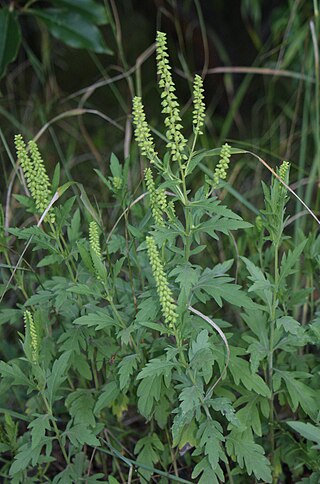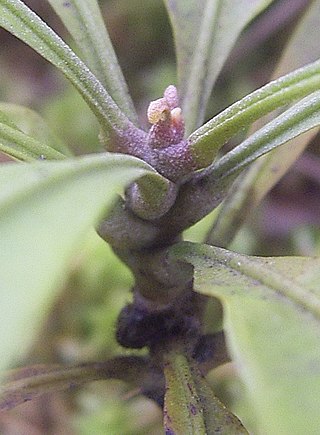
Clover or trefoil are common names for plants of the genus Trifolium, consisting of about 300 species of flowering plants in the legume or pea family Fabaceae originating in Europe. The genus has a cosmopolitan distribution with highest diversity in the temperate Northern Hemisphere, but many species also occur in South America and Africa, including at high altitudes on mountains in the tropics. They are small annual, biennial, or short-lived perennial herbaceous plants, typically growing up to 30 centimetres (12 in) tall. The leaves are trifoliate, monofoliate, bifoliolate, quinquefoliolate, hexafoliolate, septafoliolate, etcetera, with stipules adnate to the leaf-stalk, and heads or dense spikes of small red, purple, white, or yellow flowers; the small, few-seeded pods are enclosed in the calyx. Other closely related genera often called clovers include Melilotus and Medicago.

Bidens is a genus of flowering plants in the aster family, Asteraceae. The genus include roughly 230 species which are distributed worldwide. Despite their global distribution, the systematics and taxonomy of the genus has been described as complicated and unorganized. The common names beggarticks, black jack, burr marigolds, cobbler's pegs, Spanish needles, stickseeds, tickseeds and tickseed sunflowers refer to the fruits of the plants, most of which are bristly and barbed. The generic name refers to the same character; Bidens comes from the Latin bis ("two") and dens ("tooth").

Ragweeds are flowering plants in the genus Ambrosia in the aster family, Asteraceae. They are distributed in the tropical and subtropical regions of the Americas, especially North America, where the origin and center of diversity of the genus are in the southwestern United States and northwestern Mexico. Several species have been introduced to the Old World and some have naturalized and have become invasive species. Ragweed species are expected to continue spreading across Europe in the near future in response to ongoing climate change.

Abutilon is a large genus of flowering plants in the mallow family, Malvaceae. It is distributed throughout the tropics and subtropics of the Americas, Africa, Asia, and Australia. General common names include Indian mallow and velvetleaf; ornamental varieties may be known as room maple, parlor maple, or flowering maple. The genus name is an 18th-century Neo-Latin word that came from the Arabic ’abū-ṭīlūn, the name given by Avicenna to this or a similar genus.

Ceanothus is a genus of about 50–60 species of nitrogen-fixing shrubs and small trees in the buckthorn family (Rhamnaceae). Common names for members of this genus are buckbrush, California lilac, soap bush, or just ceanothus. "Ceanothus" comes from Ancient Greek: κεάνωθος (keanōthos), which was applied by Theophrastus to an Old World plant believed to be Cirsium arvense.

Helianthus is a genus comprising about 70 species of annual and perennial flowering plants in the daisy family Asteraceae commonly known as sunflowers. Except for three South American species, the species of Helianthus are native to North America and Central America. The best-known species is the common sunflower. This and other species, notably Jerusalem artichoke, are cultivated in temperate regions and some tropical regions, as food crops for humans, cattle, and poultry, and as ornamental plants. The species H. annuus typically grows during the summer and into early fall, with the peak growth season being mid-summer.

Coprosma is a genus of flowering plants in the family Rubiaceae. It is found in New Zealand, Hawaiian Islands, Borneo, Java, New Guinea, islands of the Pacific Ocean to Australia and the Juan Fernández Islands.

Epacris is a genus of about forty species of flowering plants in the family Ericaceae. It was formerly treated in a closely related but separate family Epacridaceae, but the various genera within Epacridaceae including Epacris have been revised in their relationships to each other and brought under the common umbrella of the Ericaceae. The genus Epacris is native to eastern and southeastern Australia, New Caledonia and New Zealand. The species are known as heaths or Australian heaths.

Baccharis is a genus of perennials and shrubs in the aster family (Asteraceae). They are commonly known as baccharises but sometimes referred to as "brooms", because many members have small thin leaves resembling the true brooms. They are not at all related to these however, but belong to an entirely different lineage of eudicots. B. halimifolia is commonly known as "groundsel bush", however true groundsels are found in the genus Senecio.

Lepidoziaceae is a family of leafy liverworts. It is a group of small plants that are widely distributed.

The Dioncophyllaceae are a family of flowering plants consisting of three species of lianas native to the rainforests of western Africa.

Houstonia (bluet) is a genus of plants in the family Rubiaceae. Many species were formerly classified, along with other genera since segregated elsewhere, in a more inclusive genus Hedyotis.

Celmisia is a genus of perennial herbs or subshrubs, in the family Asteraceae. Most of the species are endemic to New Zealand; several others are endemic to Australia.

The gray flying fox is a species of flying fox in the family Pteropodidae. It is not to be confused with the grey flying fox. It is found in Indonesia, but not in the Philippines, despite occasional reference to such. Very little is known about this species. The gray flying fox has small size and neutral coloration with a brownish head and an orange abdomen. It probably roosts individually or in small groups. It was listed on appendix II of CITES, and is classified as "Data Deficient" by the IUCN. This species has been decimated by hunting for bushmeat in Indonesia. The hunters use fishing hooks, ropes, and other supplies to hunt the bats. The ropes and hooks are placed along their flight paths, tearing and ensnaring the bats' wings when are flying. In the course of a hunting season, entire colonies can be killed.
Herbertus is a genus of liverworts in the family Herbertaceae. The genus has a broad global or cosmopolitan distribution, including sixteen species that occur in Eurasia:

Thamnobryum is a genus of moss in the family Neckeraceae. There are about 50 species. The genus is distributed throughout the world.

Lipochaeta, common name nehe, is a genus of flowering plants in the family Asteraceae that is endemic to Hawaii.

Riccardia is a plant genus in the liverwort family Aneuraceae.

Lophocolea is a genus of liverworts belonging to the family Lophocoleaceae. The genus has a cosmopolitan distribution.


















